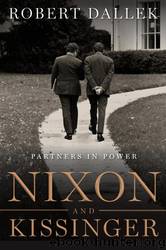Nixon and Kissinger: Partners in Power by Robert Dallek

Author:Robert Dallek [Dallek, Robert]
Language: eng
Format: epub
Tags: mom 04/05/2014
ISBN: 9780060722302
Amazon: 0060722312
Goodreads: 152545
Publisher: HarperCollins
Published: 2007-01-02T06:00:00+00:00
Nixon used his address to speak directly to the Soviets. “We expect you to help your allies,” he said, “and you cannot expect us to do other than to continue to help our allies, but let us … help our allies only for the purpose of their defense, not for the purpose of launching invasions against their neighbors. Otherwise the cause of peace … will be seriously jeopardized.”
Nixon’s criticism of Moscow was coupled with a strong appeal for
continuing recent gains in their improving relations. “Our two nations have made significant progress in our negotiations in recent months,”
Nixon declared. “We are near major agreements on nuclear arms limitation, on trade, on a host of other issues. Let us not slide back toward the dark shadows of a previous age. We, the United States and the Soviet Union, are on the threshold of a new relationship that can serve not only the interests of our two countries, but the cause of world peace. We are prepared to continue to build this relationship. The responsibility is yours if we fail to do so.”
Like Nixon and Kissinger, Brezhnev saw relations with its super-
power rival as more important than the conflict in Vietnam, especially since the North seemed headed for an ultimate victory. During the three days after Nixon’s speech, both sides stroked each other with an eye to saving the Summit. On May 9, Nixon ordered Kissinger to go all out in creating the impression that “I am absolutely determined to end the war and will take whatever steps are necessary to accomplish this goal … We should go for broke.”
Yet at the same time, he wanted Henry to make clear that this was
nothing like the confrontation with Moscow over Cuba in October 1962.
Unlike Kennedy, he had not put a blockade in place, which would have required stopping Soviet and other supply ships heading for North Viet-The Warriors as Peacemakers 387
nam. Mining would be sufficient to close North Vietnam’s ports. That morning, Henry called in Dobrynin to tell him that “in areas outside Southeast Asia, we have continued to do business as promised.”
On May 11, the controlled Soviet press offered muted criticism of
U.S. mining of the harbor at Haiphong, while the Soviet economics minister told the American press that he was confident the Summit would occur. A letter from Brezhnev to Nixon that day implicitly confi rmed the minister’s statement by saying nothing about their meeting in Moscow.
Lingering doubts about Soviet commitment to the Summit disappeared
on May 12, when Dobrynin told Kissinger that his government would be asking procedural questions about the meeting in the next two days. “We have passed the crisis,” Henry told the president. “I think we are going to be able to have our mining and bombing and have our Summit too.”
Moscow’s decision to go ahead with the Summit buoyed Nixon. He
wanted his staff to use the Soviet commitment against political opponents. News accounts depicting him as angry, rash, and intemperate in risking the Moscow meeting by expanding the air and sea war incensed him.
Download
This site does not store any files on its server. We only index and link to content provided by other sites. Please contact the content providers to delete copyright contents if any and email us, we'll remove relevant links or contents immediately.
| U.K. Prime Ministers | U.S. Presidents |
Waking Up in Heaven: A True Story of Brokenness, Heaven, and Life Again by McVea Crystal & Tresniowski Alex(37786)
Empire of the Sikhs by Patwant Singh(23073)
We're Going to Need More Wine by Gabrielle Union(19034)
Hans Sturm: A Soldier's Odyssey on the Eastern Front by Gordon Williamson(18574)
Leonardo da Vinci by Walter Isaacson(13316)
The Radium Girls by Kate Moore(12018)
Tools of Titans by Timothy Ferriss(8366)
Educated by Tara Westover(8046)
How to Be a Bawse: A Guide to Conquering Life by Lilly Singh(7472)
Permanent Record by Edward Snowden(5838)
The Last Black Unicorn by Tiffany Haddish(5629)
The Rise and Fall of Senator Joe McCarthy by James Cross Giblin(5275)
Promise Me, Dad by Joe Biden(5141)
The Wind in My Hair by Masih Alinejad(5092)
A Higher Loyalty: Truth, Lies, and Leadership by James Comey(4954)
The Crown by Robert Lacey(4807)
The Iron Duke by The Iron Duke(4349)
Joan of Arc by Mary Gordon(4101)
Stalin by Stephen Kotkin(3957)
